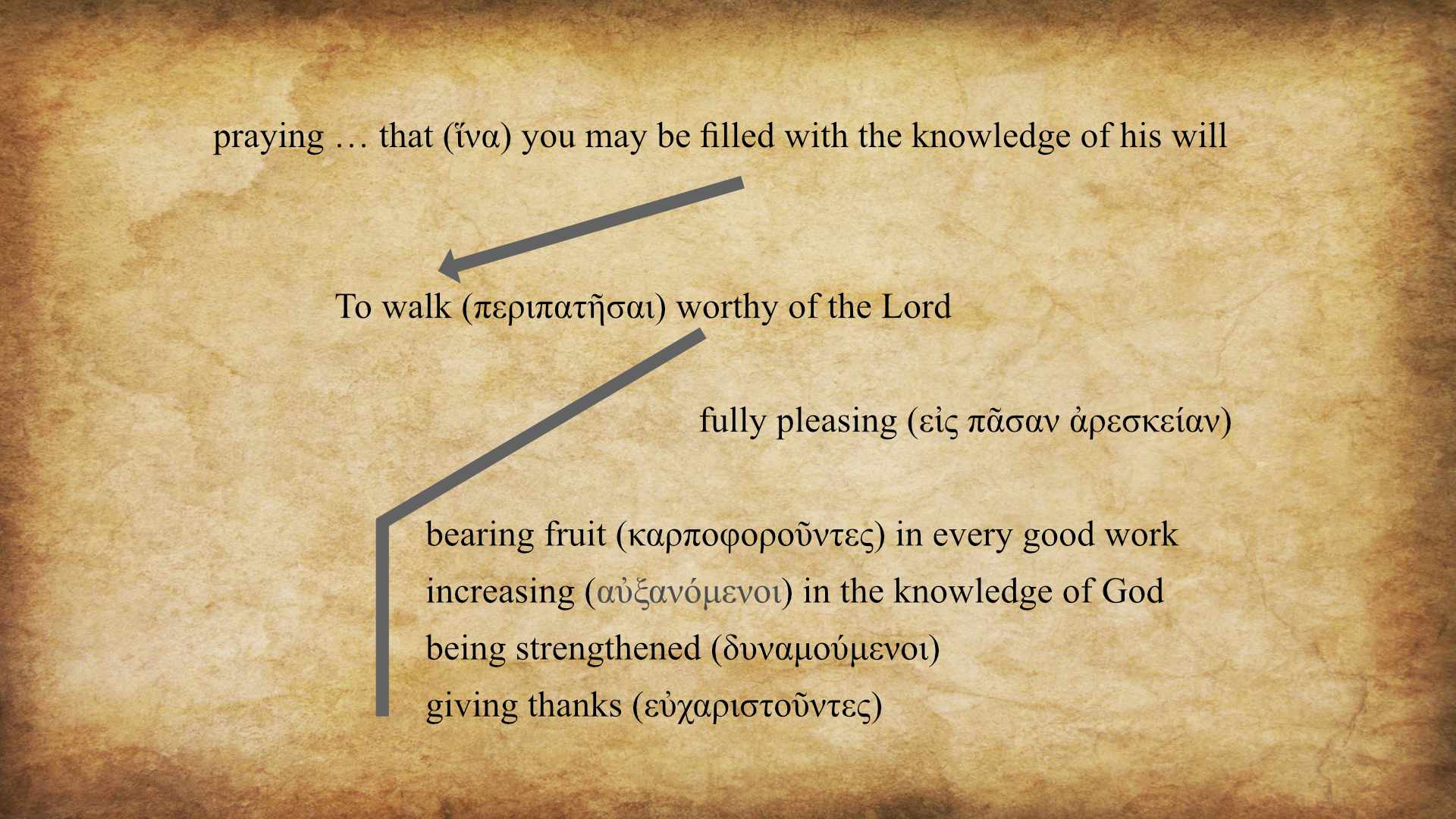For an Informed Love of God
You are here
Does Paul have One or Two Purposes for his Prayer? (Col 1:10)
One of the real values of knowing Greek is to be able to clearly see the sequencing of ideas. Greek is more than capable of lining up a series of prepositional, participial, infinitive (and other) phrases, since it is a paratactic language. This means it can place series of phrases side-by-side (παράταξις), without conjunctions to indicate the relationship between them.

English, on the other hand, is a hypotactic language, which uses conjunctions to indicate subordinate or coordinate relationships between clauses, putting one phrase under the other (ὑπόταξις). In other words, if you just translate word-for-word, you usually get poor English, or in the worst case, gibberish. But if you want to write better English, you have to interpret the nature of the relationships between phrases.
Consider Paul’s prayer for the Colossian church in 1:9–12. What is the relationship of the phrases to each other? Even in the opening sentence there can be confusion. Paul prays that they may be filled “with the knowledge of his will” ... “so that you may live a life worthy of the Lord and please him in every way: (NIV, see also NET, NLT)” The use of the colon indicates that the translators (rightly) think that the following phrases are identifying what it means to be “worthy” and “please” him. I don’t especially like colons because it makes it difficult to read the passage out loud, but in this case it is the best way to express Paul’s flow of thought.
But what is the purpose of Paul’s prayer? Is it to both “live a life worthy of the Lord” and also to “please him in every way” as the NIV reads? If there are two goals, what is the difference between the two? Word-for-word the verse says, “that you may walk worthy of the Lord (περιπατῆσαι ἀξίως τοῦ κυρίου), in every way pleasing (εἰς πᾶσαν ἀρεσκείαν), in every good work bearing fruit (ἐν παντὶ ἔργῳ ἀγαθῷ καρποφοροῦντες) and increasing in the knowledge of God (καὶ αὐξανόμενοι τῇ ἐπιγνώσει τοῦ θεοῦ,).
If you look at the other translations, you will see how they line up these phrases differently. The NASB doesn’t subordinate anything: “walk in a manner worthy of the Lord, to please Him in all respects, bearing fruit in every good work and increasing in the knowledge of God”(see also ESV, NRSV).
The CSB holds an intermediate position between the NIV and NASB/ESV: ”so that you may walk worthy of the Lord, fully pleasing to him: bearing fruit in every good work and growing in the knowledge of God.”
The question here is if “in every way pleasing (εἰς πᾶσαν ἀρεσκείαν)” is fully parallel to “walk worthy of the Lord (περιπατῆσαι ἀξίως τοῦ κυρίου).” I suspect that the difference between a prepositional phrase and an infinitival phrase is significant enough to not see them as parallel. Here is what I suspect is the flow of thought.
- Paul prays “that (ἵνα) you may be filled with the knowledge of his will in all spiritual wisdom and understanding.”
- The infinitive of purpose spells out the purpose of the prayer: “that you may walk worthy of the Lord (περιπατῆσαι ἀξίως τοῦ κυρίου).”
- This means the Colossians will be “fully pleasing to him” (εἰς πᾶσαν ἀρεσκείαν).”
- The two participles spell out the characteristics of a life that is pleasing: (1) “bearing fruit in every good work (ἐν παντὶ ἔργῳ ἀγαθῷ καρποφοροῦντες); (2) “and increasing in the knowledge of God” (καὶ αὐξανόμενοι τῇ ἐπιγνώσει τοῦ θεοῦ).
Paul continues his description into the next two verses with two more participial phrases, “being strengthened” (δυναμούμενοι) and “giving thanks” (εὐχαριστοῦντες).
Regardless of one’s personal interpretation of this passage, it is a knowledge of the Greek with its series of phrases that is needed to really understand what Paul is saying.


